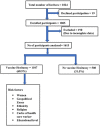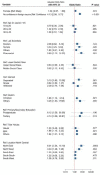COVID-19 vaccine hesitancy in six geopolitical zones in Nigeria: a cross-sectional survey
- PMID: 36187029
- PMCID: PMC9482243
- DOI: 10.11604/pamj.2022.42.179.34135
COVID-19 vaccine hesitancy in six geopolitical zones in Nigeria: a cross-sectional survey
Abstract
Introduction: the high expectations that heralded the development of COVID-19 vaccines has been plagued with vaccine hesitancy (VH). The prevalence and associated factors of COVID-19 VH in the six geopolitical zones in Nigeria are explored.
Methods: using a cross sectional survey, a pre-tested and validated questionnaire on a "Google form" was distributed via social media platforms and hard copies in the six geopolitical zones of Nigeria. Included, using a chain-reference sampling technique, were healthcare workers (HCW), university students and adults in the general population. Participants who expressed unwillingness to receive COVID-19 vaccine in the event of an available vaccine were considered to have vaccine hesitancy. Frequency and percentage were used to describe categorical variables. Multivariable logistic regression analysis was used to assess for factors associated with VH. Level of significance was set at 5% on two-sided tails test.
Results: among 1615 respondents, mean (standard deviation) age was 36.7 (11.3) years, and 847 (52.4%) were males. More than half were healthcare workers (943; 58.4%), 97.4% had at least secondary level of education, and majority 60.5% belonged to the upper social class. The prevalence of VH was 68.5% (1107/1615), and 67.2% preferred foreign manufactured COVID-19 vaccines. On multivariable regression analysis, residence in Northeast (AOR 6.01, 95% CI 2.24, 16.10) and Northwest (AOR 3.33, 95% CI 1, 48, 7.48) geopolitical zones, the Igbo ethnic group (AOR 1.88, 95% 1.10, 3.22), Christians (AOR 1.86, 95% 1.10, 3.14), nurses (AOR 3.50, 95% CI 1.25, 9.80), pharmacist (AOR 5.82, 95% CI 2.12, 16.32) and participants without confidence in foreign vaccines (AOR 4.13, 95% CI 2.99, 5.72) were at higher likelihood of VH.
Conclusion: vaccine hesitancy is high among adults in Nigeria, with higher likelihood among the Igbo ethnic group, Christian faith, residence in Northeast and Northwest geopolitical zones and those with an aversion to foreign-made vaccines. Targeted interventions are required for the desired COVID-19 vaccine uptake rate and herd immunity.
Keywords: COVID-19; Nigeria; vaccine hesitancy.
Copyright: Babatunde Oluwatosin Ogunbosi et al.
Conflict of interest statement
The authors declare no competing interests.
Figures
Similar articles
-
COVID-19 vaccine hesitancy among people living with HIV in a low-resource setting: A multi-center study of prevalence, correlates and reasons.Vaccine. 2023 Apr 6;41(15):2476-2484. doi: 10.1016/j.vaccine.2023.02.056. Epub 2023 Feb 23. Vaccine. 2023. PMID: 36932032 Free PMC article.
-
COVID-19 vaccine hesitancy among healthcare workers and its socio-demographic determinants in Abia State, Southeastern Nigeria: a cross-sectional study.Pan Afr Med J. 2021 Sep 3;40:10. doi: 10.11604/pamj.2021.40.10.29816. eCollection 2021. Pan Afr Med J. 2021. PMID: 34650660 Free PMC article.
-
Predictors of the willingness to accept a free COVID-19 vaccine among households in Nigeria.Vaccine. 2024 Oct 3;42(23):126225. doi: 10.1016/j.vaccine.2024.126225. Epub 2024 Aug 30. Vaccine. 2024. PMID: 39216208
-
COVID-19 vaccination in Nigeria: A rapid review of vaccine acceptance rate and the associated factors.PLoS One. 2022 May 11;17(5):e0267691. doi: 10.1371/journal.pone.0267691. eCollection 2022. PLoS One. 2022. PMID: 35544545 Free PMC article. Review.
-
Knowledge about, attitude and acceptance towards, and predictors of intention to receive the COVID-19 vaccine among cancer patients in Eastern China: A cross-sectional survey.J Integr Med. 2022 Jan;20(1):34-44. doi: 10.1016/j.joim.2021.10.004. Epub 2021 Oct 26. J Integr Med. 2022. PMID: 34774463 Free PMC article. Review.
Cited by
-
COVID-19 Vaccine Hesitancy Among Older Adults in a Geriatric Centre in Nigeria.Cureus. 2023 Dec 26;15(12):e51102. doi: 10.7759/cureus.51102. eCollection 2023 Dec. Cureus. 2023. PMID: 38274936 Free PMC article.
-
Exploring the perceptions and experiences of mobile teams on COVID-19 vaccine uptake at the community level: evidence from Benue and Niger states.BMC Public Health. 2024 Jul 25;24(1):1996. doi: 10.1186/s12889-024-19562-y. BMC Public Health. 2024. PMID: 39061021 Free PMC article.
-
Population and vaccine hesitancy: a demographic and Socio-behavioural examination of a barrier to Covid-19 herd immunity in Nigeria.Sci Afr. 2023 Mar;19:e01508. doi: 10.1016/j.sciaf.2022.e01508. Epub 2022 Dec 17. Sci Afr. 2023. PMID: 36570592 Free PMC article.
-
Understanding vaccine hesitancy: Insights from social media on polio, human papilloma virus, and COVID-19 in Zambia.Digit Health. 2025 Mar 18;11:20552076251326131. doi: 10.1177/20552076251326131. eCollection 2025 Jan-Dec. Digit Health. 2025. PMID: 40109405 Free PMC article.
-
COVID-19 vaccine hesitancy among adults in Liberia, April-May 2021.PLoS One. 2024 Apr 17;19(4):e0297089. doi: 10.1371/journal.pone.0297089. eCollection 2024. PLoS One. 2024. PMID: 38630778 Free PMC article.
References
-
- World Health Organization WHO coronavirus (COVID-19) dashboard. Accessed Dec 20 2021.
-
- Larson HJ, Jarrett C, Eckersberger E, Smith DMD, Paterson P. Understanding vaccine hesitancy around vaccines and vaccination from a global perspective: a systematic review of published literature, 2007-2012. Vaccine. 2014;32(19):2150–9. - PubMed
MeSH terms
Substances
LinkOut - more resources
Full Text Sources
Medical


